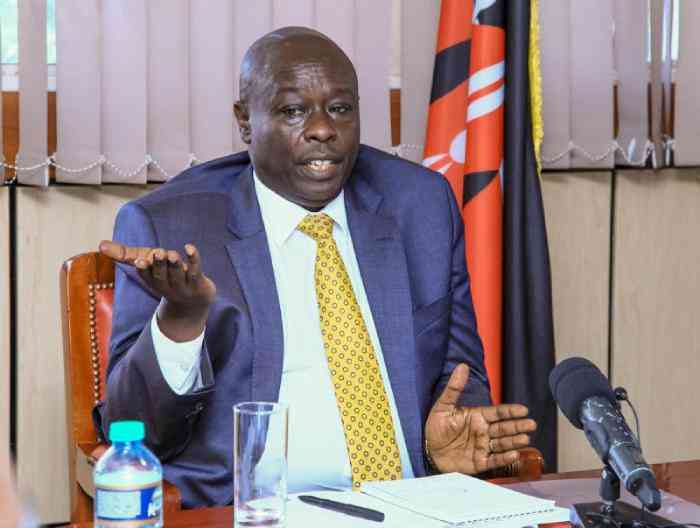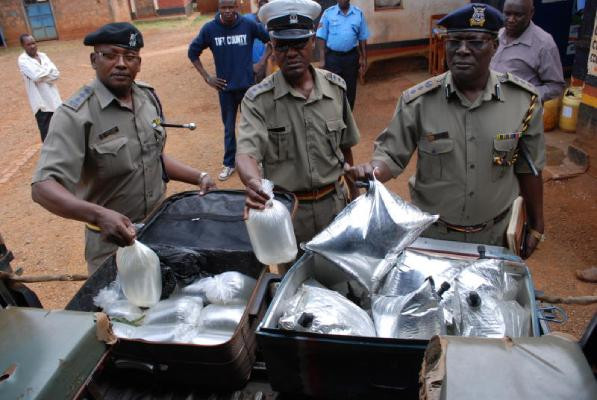Though Deputy President Rigathi Gachagua is determined to reduce alcohol consumption in Central region, rebellion is brewing on the ground.

While the DP is concerned that illicit brews are ruining families and lives, traders in the liquor business are crying foul, accusing Gachagua of orchestrating a campaign to kill their legit enterprises.
They are up in arms against the second in command whom they accuse of reneging on his promise to protect and nurture small businesses.
Traders in Kiambu, Muranga, Kirinyaga and Nyeri counties feel the crackdown ordered by Gachagua not only will it destroy their only source of livelihood, but render thousands of people working in bars jobless as law enforcers go on an extortion spree.
Further, they argue, economies in these counties will be dented since the liquor business generates a lot of revenue besides supporting the hospitality sub-sector.
The traders are categorical that instead of targeting everyone selling alcohol, the focus should be on contrabands, fakes, illicit and second-generation brews linked to marital conflicts, broken families, the abdication of family roles, gender-based violence, school dropouts and unwanted pregnancies.
Worrying levels
According to Gachagua, each town should have a single bar since the consumption of illicit liquor has reached worrying levels and threatens to clear a generation of the youth, particularly in Central.
"We shall not accept a situation where youths are being killed or become unproductive because of consumption of illicit alcohol. The administrators must eradicate alcoholism and drug abuse. The Ruto Administration will not negotiate on this unfortunate matter," said the DP on January 26, 2023 when he ordered administrators to crack the whip on the alcohol menace.
But liquor traders are adamant that it is the government to blame for allowing cheap and unregulated illicit liquor insisting that a line must be drawn between certified and uncertified alcoholic drinks.
"Bar owners do not manufacture alcohol, the efforts should be redirected to ensuring that the products being sold by our members meet required standards," says Simon Njoroge national chairman of Bar Hotels and Liquor Traders Association (BAHLITA).
Even though DP Gachagua maintains that so serious is the problem warrants the crackdown, a survey done by a state agency five years ago paints a totally different picture.
According to findings by National Authority for the Campaign against Alcohol and Drug Abuse (NACADA) in 2017, Central region was a distant seventh among the eight regions sampled on the production of illicit brews.

Respondents from the region indicated a prevalence rate of 41.2 per cent about their perception of the production of illicit brews. Central was ahead of North Eastern, which trailed at 13.6 per cent in the sample of respondents aged between 15 and 65 years.
The leading region was Nairobi at 62.7 per cent followed by Coast (51.7 per cent), Nyanza (46.7 per cent), Eastern (46.2 per cent), Rift Valley (43.5 per cent) and Western at 41.9 per cent.
While the situation might have changed, only the latest empirical data can validate the DP's concerns on the current state on the ground. NACADA is set to release its latest research on the alcohol problem in Kenya.
One of the core functions of the authority is carrying out public education on alcohol and drug abuse in collaboration with public or private bodies and institutions. Assuming the problem is not as bad as portrayed by Gachagua, then traders in alcoholic drinks from Central have every reason to complain.
Unfair action
"What Gachagua is doing is to profile some businesses yet as bar owners we pay tax and other levies. Setting police on us is unfair and unnecessary," laments Richard Kagiri, chairman of the Kiambu Bar Owners Association.
Last month, women in Ruiru, Kiambu County, protested against the sale of illicit brews in the area. The women from Kiratina village accused local administrators of doing nothing to tame the vice.
The women said their husbands and youth were hooked to illicit alcohol and bhang. "We demand prompt action. My husband died in one of the bars. I was called to pick his body as the bar remained open," complained one of them.
Alcohol abuse in Central is perceived to be a major problem due to high levels of consumption, ease of availability, affordability and accessibility.
Njoroge says instead of targeting bar owners, the government ought to be strict on licensing since some traders are not honest.
"One of the requirements for one to be licensed to operate a bar and restaurant is having a kitchen. But some entrepreneurs just establish a make-shift kitchen to sell mutura or eggs and qualify to as bars and restaurants," notes the BAHLITA boss.
Some of the documents needed to operate a bar and restaurant include a county single-business permit, public health license, medical certificate, fire clearance certificate, Music Copyright of Kenya certificate, Performers Rights Society certificate and National Environment Management Authority (NEMA) certificate.
Illicit liquor brewed without adherence to standards, and verification and authorisation by the Kenya Bureau of Standards (KEBS) is normally sold in backstreet drinking dens and unlicensed outlets.
"Crackdowns won't solve the problem because they are short-term measures, but passing the necessary legislations with the necessary flam work and structure to deal with the same will yield a long-term solution to the problem," observes Njoroge.
Section 10 of cap 128 laws of Kenya mandates chiefs and assistant chiefs powers to prohibit or restrict consumption or possession of intoxicating liquor, and the supply of such liquor to young persons as well as restricting the holding of drinking bouts.
"The police, chiefs and assistant chiefs know where the illicit brews are made, the people involve and all the dens but instead of going for them; they target established businesses where they arrest our patrons and workers all in a bid to frustrate and squeeze bribes from us," complains Kagiri.
Doubling down
While recently inaugurating a new office for Assistant County Commissioner office at Cianda in Kimbaa Sub County, Interior Cabinet Secretary Kindiki Kithure vowed to sustain the crackdown.
"I am fully committed to ending the alcohol menace that has left many families in the Central region in great misery and we shall not relent in the fight against this threat," said Kindiki.
The CS ordered assistant chiefs, chiefs and police to carry out operations to eradicate the alcoholism problem.
Traders like George Komu who owns a bar in Kiambu now claims police and administrators are using the crackdown to extort and shut down their legit businesses.
"Police just storm into our duly registered business premises and cart away alcoholic drinks despite us showing proof that we are dully licensed; this uncouth approach is killing our businesses," decries Komu.
According to the businessman, the revenue that the government collects from one wines and spirit shop is equivalent to the tax paid by ten retail shops.
"Gachagua should have a sitting with us and security agents to come up with the best approach because we are equally unhappy with the contrabands, illicit and second generation drinks destroying youths," he says.
Unless dialogue is initiated, adds Komu, the problem will persist and the crackdown will remain a cosmetic exercise only benefitting police while killing licensed businesses.
According to Mwangi Githinji, a community leader in Murang'a County, the illicit brew war should be fashioned along a similar campaign in 2015, which involved all stakeholders including the church, media and politicians.
"In 2015, anybody who had information regarding the sale of illicit brew could send a message to the media, then those in the media would send alerts prompting police to swing into action. The successful campaign unfortunately did not last long," recounts Githinji.
Back to Kiambu, Kagiri feels the government is directing its energy and force at innocent entrepreneurs who have created employment opportunities.
The Kiambu Bar Owners chairman is worried that the crackdown, if not handled well, will lead to collapse of many legit businesses.
"We elected the current administration because they promised that one of the things they will do is to protect businesses. Gachagua himself in his numerous trips in Central pledged that one of his main agenda is promoting businesses and now he seems to have forgotten and turned against us," says Kagiri.
The official however clarifies that their position should not be misconstrued that they are they support excess alcohol consumption and sale of illicit brews.
Githunguri MP Gathoni Wa Muchomba who once was a staunch campaign against illicit liquor opened up on why the crusade lost momentum blaming conflict of interest among those charged will the responsibility of eradicating unwanted alcoholic drinks.
"Administration officers like chiefs, their assistants, police and highly influential politicians close to the powers frustrated the fight against illicit brew," she states.
Wamuchomba avers that if the latest fight is to succeed, President William Ruto and his deputy must read the riot act to officers involved in the crackdown.
"Those behind illicit brews are not licensed bar owners neither are they addicts who can't survive without the drinks. In my constituency I have a chief who is in rehabilitation after becoming an addict of illicit liquor; how then can this campaign be successful," notes the lawmaker.
Additional reporting by Hudson Gumbihi
 The Standard Group Plc is a multi-media organization with investments in media
platforms spanning newspaper print
operations, television, radio broadcasting, digital and online services. The
Standard Group is recognized as a
leading multi-media house in Kenya with a key influence in matters of national and
international interest.
The Standard Group Plc is a multi-media organization with investments in media
platforms spanning newspaper print
operations, television, radio broadcasting, digital and online services. The
Standard Group is recognized as a
leading multi-media house in Kenya with a key influence in matters of national and
international interest.
